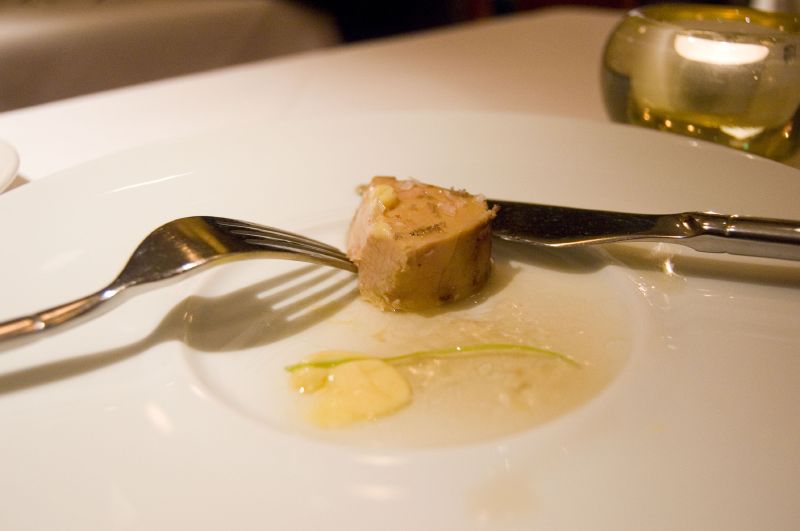« Stuff to read | Main | Greatest hits 2010 »
December 28, 2010
Is foie gras ok after all?
In Why foie gras is not unethical, food site Serious Eats investigates the conditions at American foie gras farms. According to their research, ducks are fine with being force-fed so their livers grow to ten percent of their total body weight (there's a video of the process, called gavage, in the article). The life of a foie gras duck is - apparently - more comfortable than the life of an average chicken.

So why does foie gras have a bad reputation? J. Kenzi Lopez-Alt writes:
"In large part, it's because foie gras is an easy target. There are only three foie farms in the country, and none of them have the money or government clout to defend themselves the way that the chicken or beef industry does. It's a food product that is marketed directly at the affluent, and the rich are always an easy target. As an occasional delicacy, it's also a food that's relatively easy for most people to give up.
Personally, I find this kind of protesting abhorrent. If you are going to protest anything, it should be the industrial production of eggs, where chickens are routinely kept in cages so small that they can't even turn around for an entire year. The problem, of course, is that you tell people to stop eating cheap eggs, and nobody will listen."
It's the same point I tried to make about fur last year: The debate is confusing, boycotting something you would never buy anyway is useless, and (assuming you're ok with animals being killed by human beings at all) it should be possible to produce these products ethically.
I love the taste of foie gras, but are French farms as gentle as the American ones? Can I believe the information in this article? Or is the real story here that I should avoid eggs (at least in the US)?
Photo: ulterior epicure (Creative Commons)
Posted by Julie at December 28, 2010 3:02 PM
Trackback Pings
TrackBack URL for this entry:
http://www.espen.com/cgi-local/mt/mt-tb.cgi/2676
Comments
But they're not gentle. Saying that the geese are as happy as chickens does not mean that they are happy: it means the meat production industry is a cruel business. Two wrongs does not make a right. Sure, it's easier to give up foie gras than to stop eating the europrice frozen chicken fillets. But that doesn't mean you should be eating foie gras.
What you're saying is basically: Well, I'm willing to let one kind of animal be abused to decrease the price of my food, so it's okay that another animal is abused as well.
Is it?
Posted by: Martine at December 28, 2010 3:36 PM
Martine - That's not exactly what I'm trying to say, but on the other hand, maybe it is. What I mean is: For a lot of reasons, including my own health, I don't want to give up meat, fish, eggs and dairy. What I probably should be doing is researching where the products in Norwegian supermarkets come from, the way Serious Eats researched American foie gras. It would be cool to be able to do that as a journalist, and not as a political activist. Actually knowing what I eat and choosing accordingly (and maybe educating others) would help the world a whole lot more than giving up foie gras, which I buy less than once a year. Or to put it another way: I don't know a lot about Norwegian cod, but maybe that should be my political cause from now on. I could easily stop buying that. And no one has to know that I also happen to be allergic.
Posted by: Julie R. Andersen at December 28, 2010 4:49 PM
Yes, that would be a good Cause. :)
I'm not trying to be superior or anything, I'm just not gonna start eating foie gras or buy fur just because meat production in general is inhumane. It seems like a daft argument for me.
I am, however, going to start being more particular about where my meat comes from. There are farms outside Montreal that sell free-range gras-fed bison meat for realtively reasonable prices. At least it's a start.
Posted by: Martine at December 28, 2010 9:04 PM